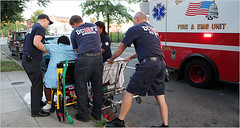Emergency response
The New York Times today has an article about Engine 10 in the H Street/Trinidad neighborhood of DC, "Firefighters Become Medics to the Poor." The station is the busiest in the city, with more than 10,000 calls per year. Most are for health-related concerns, the kinds normally taken care of by paramedics.

Doug Mills/The New York Times. Firefighters from Company 10 responding to an emergency call in Washington in late August.
The story also makes the point that this helps keep firefighters employed because overall, the number of fires is dropping. I hadn't really thought of this much, but it is probably a big reason why Fire Department officials have fought for more than 20 years separating paramedical services into a department separate from firefighting. Studies have been done, I think more than once, calling for this kind of separation in DC. See "D.C. concedes need for EMS reforms" from the Washington Times in 2006. I seem to remember studies on this in the 1980s and 1990s too.

The article is pretty kind, but as this article from Washingtonian Magazine makes clear, "What Happens When You Call 911 in Washington, DC," and as we all know in the wake of the Rosenbaum incident (and others), there are problems with EMS services in DC. The Washington Times has also reported on this, see "EXCLUSIVE: Videos, tests show failures by D.C. EMS" and "EMS report outrages families."
Daniel Wolkoff of the Brookland neighborhood lives close to 13th Street NE, which is the primary route for ambulances going to Providence Hospital. He is outraged by what he considers the overuse of sirens. Daniel is seen somewhat as a crank by many people, but he has trenchant analysis about why the Rosenbaum incident played out the way it did.
See, as the NYT article makes clear, 80% of the calls firefighters go on are medical, and a preponderance of the calls aren't really emergencies despite the blaring sirens and flashing lights. The calls are mostly for drunkenness, substance abuse issues, and homelessness.
As a result, the firefighters come to believe that most everyone is a drunk if they are lying on the street, and because they are rushing rushing adrendaline kicking in while going to the call with lights flashing and sirens blaring for every call, regardless of seriousness, they end up taking a lot for granted when they are out there on calls. This can result in death, as it did for David Rosenbaum.
It's not a lot different from the effect of repetitive driving, discussed by Malcolm Gladwell in this New Yorker article, "Wrong Turn: How the fight to make America's highways safer went off course." For the most part highway systems are designed so that people don't have to pay that much attention to what they are doing, cars are better designed and include safety devices to reduce the impact and damage from inevitable accidents, but as a result, people develop a kind of "inattentional blindness."
From the article:
There is a part of driving that is automatic and routine. There is a second part of driving that is completely unpredictable, and that is the part that requires attention." This is what Simons found with his gorilla, and it is the scariest part of inattentional blindness. People allow themselves to be distracted while driving because they think that they will still be able to pay attention to anomalies. But it is precisely those anomalous things, those deviations from the expected script, which they won't see.
Marc Green, a psychologist with an accident-consulting firm in Toronto, once worked on a case where a woman hit a bicyclist with her car. "She was pulling into a gas station," Green says. "It was five o'clock in the morning. She'd done that almost every day for a year. She looks to the left, and then she hears a thud. There's a bicyclist on the ground. She'd looked down that sidewalk nearly every day for a year and never seen anybody. She adaptively learned to ignore what was on that sidewalk because it was useless information. She may actually have turned her eyes toward him and failed to see him." Green says that, once you understand why the woman failed to see the bicyclist, the crash comes to seem almost inevitable.
"Inattentional Blindness" from the Monitor on Psychology.
Inattentional blindness can happen to firefighters too, when they are confronted with a truly emergency situation in the midst of spending most of their time on nonemergency matters.
Labels: change-innovation-transformation, emergency management planning, government oversight, provision of public services



0 Comments:
Post a Comment
<< Home